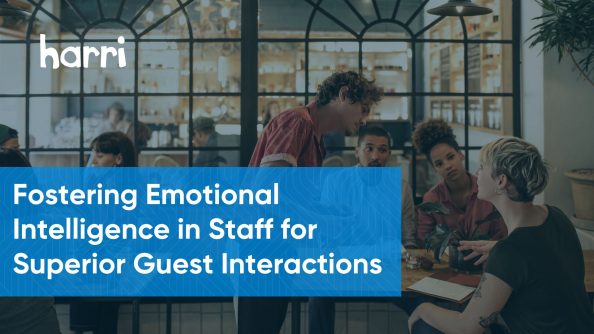The Benefits of Cross-Training Employees in Hospitality

- By Harri Insider Team | May 16, 2023
Cross-training in the hospitality industry transforms employees into versatile assets, enhancing organizational resilience and operational continuity. This training strategy not only sustains business operations but also capitalizes on the most crucial element of any organization—its people.
By preparing for inevitable absences such as sick days, vacations, and personal leave through strategic cross-training, your business can maintain seamless operations.
Flexibility is crucial. Successfully implementing cross-training involves clearly articulating its benefits to employees and managing the training process to avoid overburdening them. Continue reading for key workforce management strategies and tips to implement them effectively.

What is Cross-Training?
Cross-training equips employees with the skills to perform multiple roles or tasks, ensuring continuity when regular staff are unavailable. An ideal hospitality team is fully interchangeable and capable of supporting each other effortlessly. This enhances your organization’s agility and broadens employees’ skills, which deepens their understanding of the business’s operations and goals.
Cross-training not only allows team members to contribute more effectively to the business but also enhances their individual value within the workforce. This training method is adaptable across all hospitality sectors—lodging, food service, tourism, and more. Importantly, it doesn’t necessitate frequent role changes but enables employees to take on additional responsibilities as needed, enriching their primary role.
Cross-Training in Hospitality
In hospitality, excellent service shapes the customer experience, which is paramount. Limiting employees to a single role is less effective due to inevitable challenges like turnover and absences. Cross-training prepares your team to handle these disruptions smoothly.
Despite its challenges, notably a high turnover rate, the hospitality industry can achieve operational resilience through effective cross-training. This approach equips businesses to maintain smooth operations in the face of frequent staff changes.
For instance, a hotel front desk attendant trained in roles such as room attendant, housekeeping, or maintenance ensures continuous operations. Similarly, food service employees who are versatile in tasks ranging from cashiering to cooking and cleaning provide a seamless service experience.
The Benefits of a Cross-Trained Workforce
While employees may initially be reluctant to adopt new roles, emphasizing the career growth and increased effectiveness of such versatility is crucial. Clearly state that adaptability is essential for job retention and progression. Additionally, you should highlight that cross-training may lead to wage increases, reinforcing its importance during recruitment for sustained adherence and benefits.
Maximize Your Labor Efficiency
Labor efficiency is essential in hospitality, directly impacting revenue and controlling costs. A well-prepared workforce can adapt to new roles seamlessly, safeguarding against common industry disruptions such as employee turnover, illness, and more. By implementing cross-training with these challenges in mind, you can significantly enhance your team’s operational efficiency.
Boost Employee Morale
Hospitality work, while physically demanding and time-consuming, is rewarding due to the deep connections formed among team members. Workplace culture and camaraderie are as vital as wages and benefits. By promoting cross-training, you enhance team unity, creating a supportive, family-like environment that significantly elevates employee morale.
Heighten Job Satisfaction
Employees who engage meaningfully at work often report higher job satisfaction compared to those who contribute minimally. Cross-training not only makes staff feel valued and respected but also enhances their workplace dexterity. Highlight the benefits of increased job security and potential career opportunities, both within and beyond the organization, to encourage your team to embrace new roles enthusiastically.
Enhance Customer Service
Customer satisfaction, a key driver of repeat business, diminishes when employees are confined to single roles. By cross-training your team, you enable them to handle various functions, ensuring consistent, high-quality service even during staff absences due to vacations, paid leave, or illness.
The Flexibility Your Hospitality Business Needs
Flexibility is essential for your hospitality business. By creating a versatile workforce that can adapt to various roles quickly, you ensure continuous support across all operations. This adaptability not only enhances efficiency but also encourages a collaborative, family-like atmosphere where team members are ready and willing to support each other as needed.
Cost Savings
train employees, will save your hospitality business a bundle of money in the long run.
Cross-training employees enables flexibility to switch roles effortlessly, enhancing value and paving the way for superior customer service. This approach not only fosters team unity, reflected in top-tier service and lower turnover rates, but also reduces training costs. Consequently, your hospitality business will achieve significant long-term cost savings.

Tips for Implementing a Successful Cross-Training Program
Take action by implementing your cross-training program as soon as possible and you’ll reap the rewards within months or less. Here’s a quick look at how to best approach the implementation of such a program.
Establish a Plan of Action
Attempting to train your team in every single role within the business across a couple weeks will inevitably lead to a high attrition rate, and is likely to not leave you with the results you want. Weave together a carefully constructed plan of action for cross-training employees, stick to the plan unless it shows signs of failure and you’ll gradually acclimate your team members to new roles so they can step in as necessary.
Set Goals
Enhanced flexibility along with improved customer service are the primary aims of cross-training employees. Establish time and attendance goals along with benchmarks for employee skill and knowledge enhancement, modify those goals moving forward and strive for incremental progress.
Setting quantifiable goals is the best way to measure the success of your cross-training initiatives.
Establish Resources and Training
It is the actual training that matters more than anything else when it comes to cross-training employees in new roles. Assign managers or experienced employees to the role of trainer, dedicate time and additional resources to the actual training process and be patient with your staff as they gradually expand their boundaries. If your team members ask for additional guidance, training or resources, provide it accordingly.
Ask for Feedback
Communication in the form of dialogue is drastically superior to a top-down monologue. Request questions, concerns and ongoing feedback from your team, then implement their feedback appropriately moving forward. Harri’s employee engagement tools facilitate productive reciprocity that benefits employees as well as your hospitality business.
Review, Recognize and Adjust
Closely track scheduling, employee time and attendance after implementing your cross-training program. Our intelligent scheduling software empowers hospitality business owners and managers to make the most of their human resources, maximizing the efficiency of that human capital to improve the bottom line.
Drawbacks of Cross-Training and How to Mitigate Them
Cross-training offers significant benefits to hospitality businesses, though it’s not without challenges. Some employees may resist taking on additional responsibilities beyond their initial roles, and adapting to new tasks can be daunting. To mitigate these issues, provide supportive guidance as employees transition into new roles and communicate the value of cross-training empathetically. Acknowledging the challenges and demonstrating understanding can greatly enhance team acceptance and overall business improvement.
Put Your People First with Harri
Prioritize your team with Harri. Cross-training not only strengthens your hospitality business, making it robust against various challenges but also significantly benefits your employees. By clearly communicating the advantages of cross-training, you demonstrate your commitment to your team’s growth and resilience, ensuring they appreciate and seize the opportunity.
Harri tailors service to each individual hospitality business. Schedule a consultation with us and we’ll make sure your hardworking team is prioritized, paving a path toward better customer service and more revenue. Reach out to Harri today to request a demo!






















